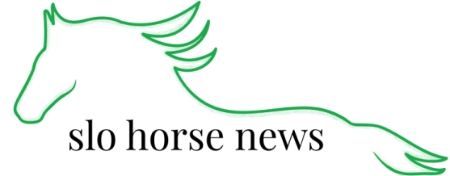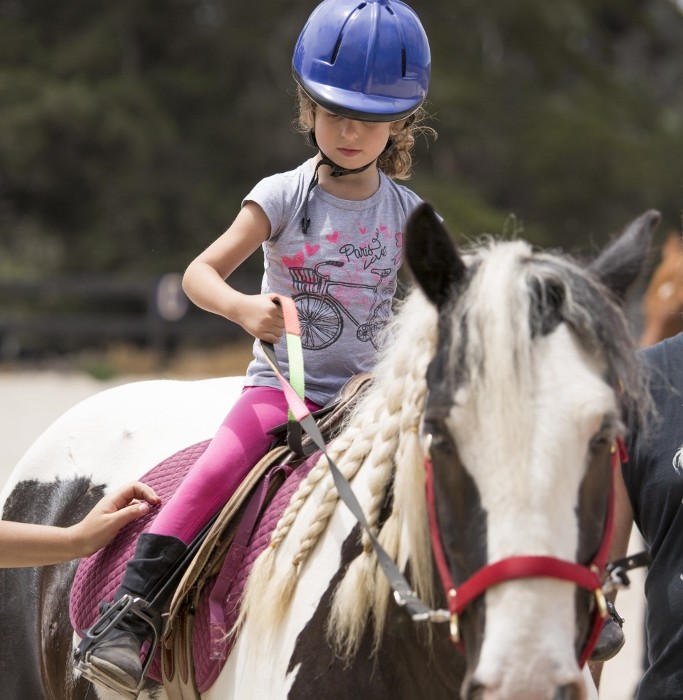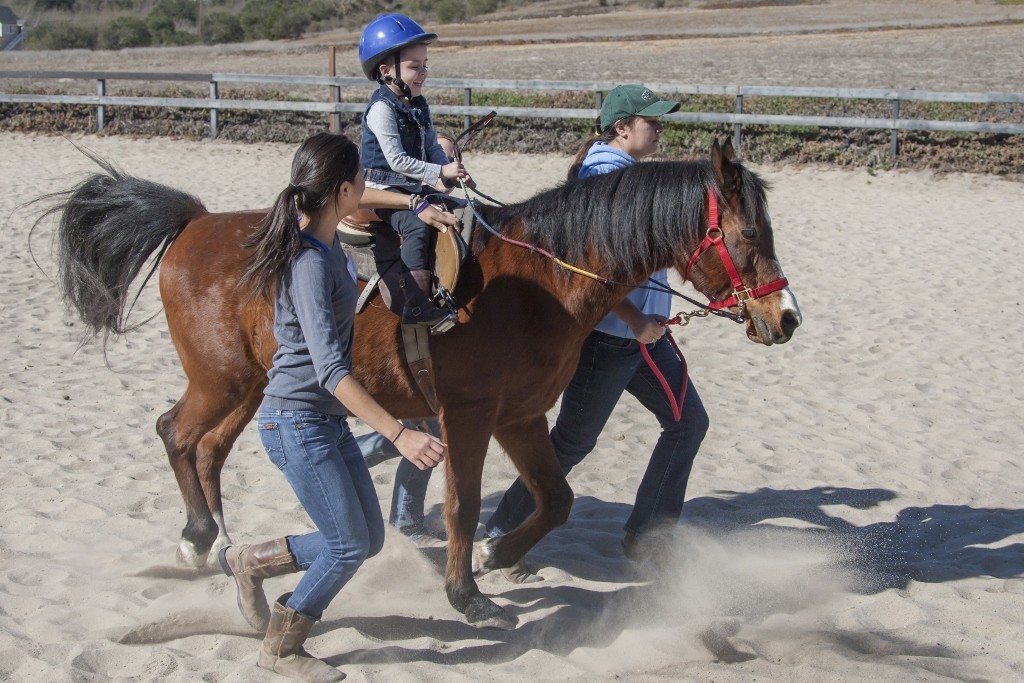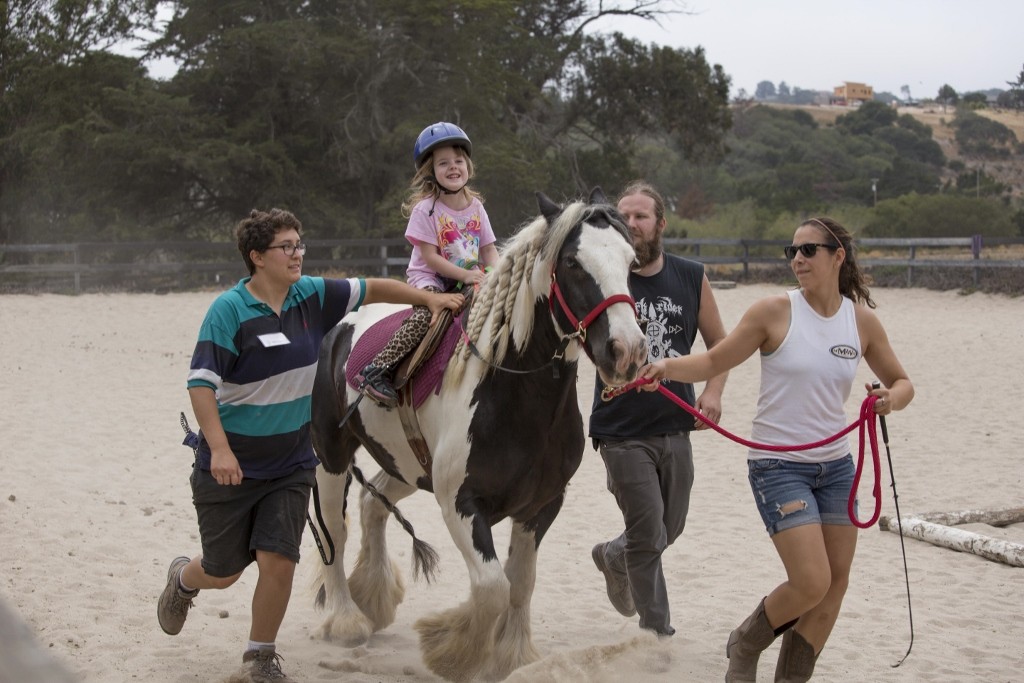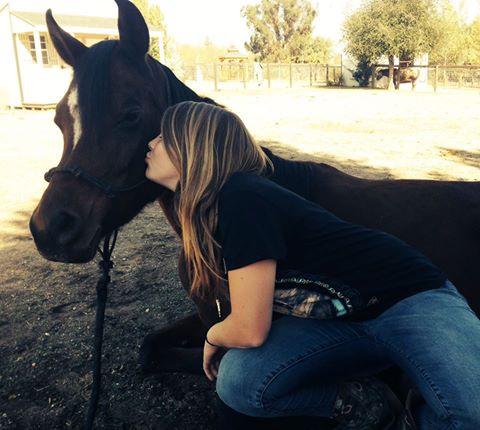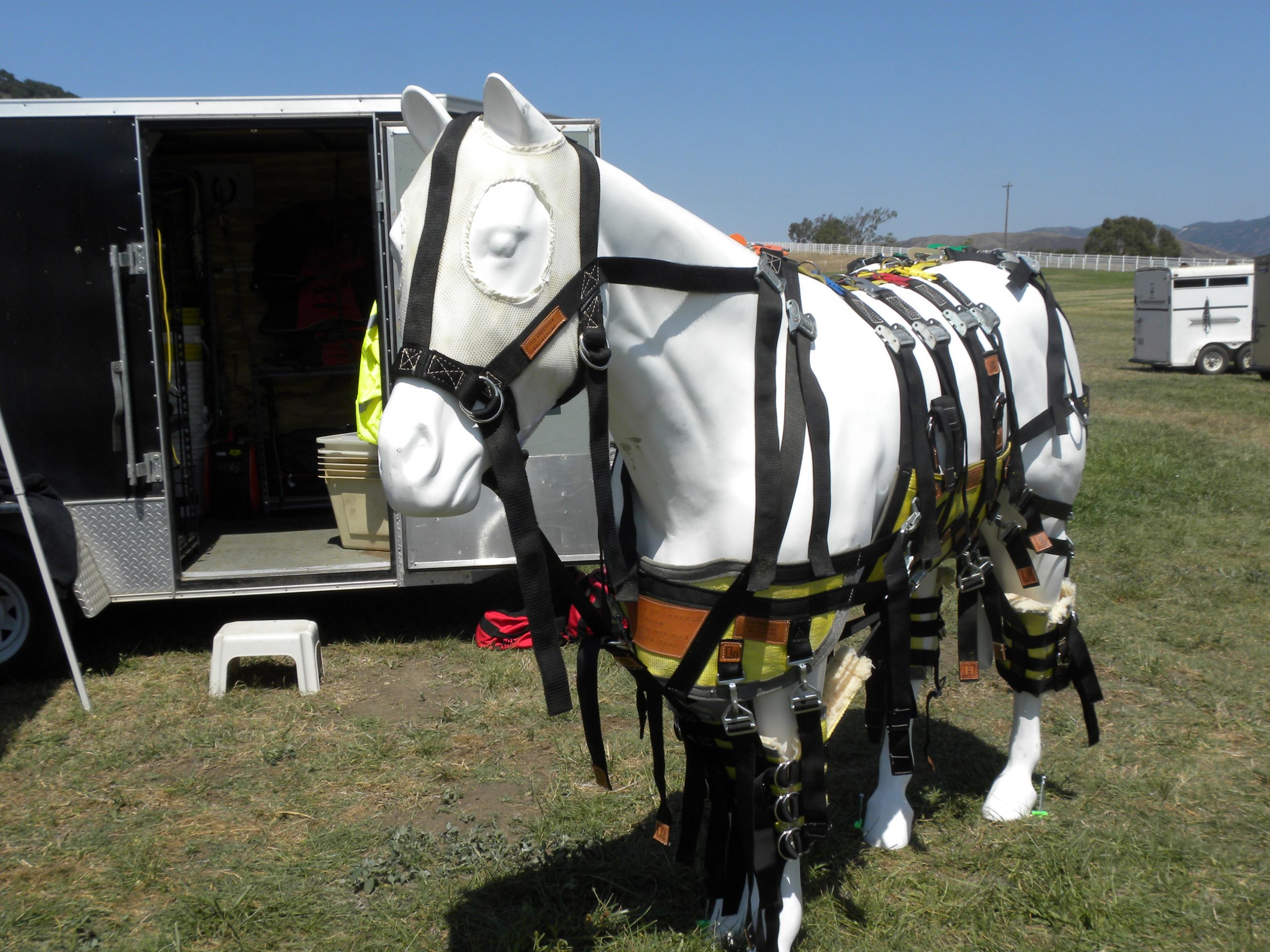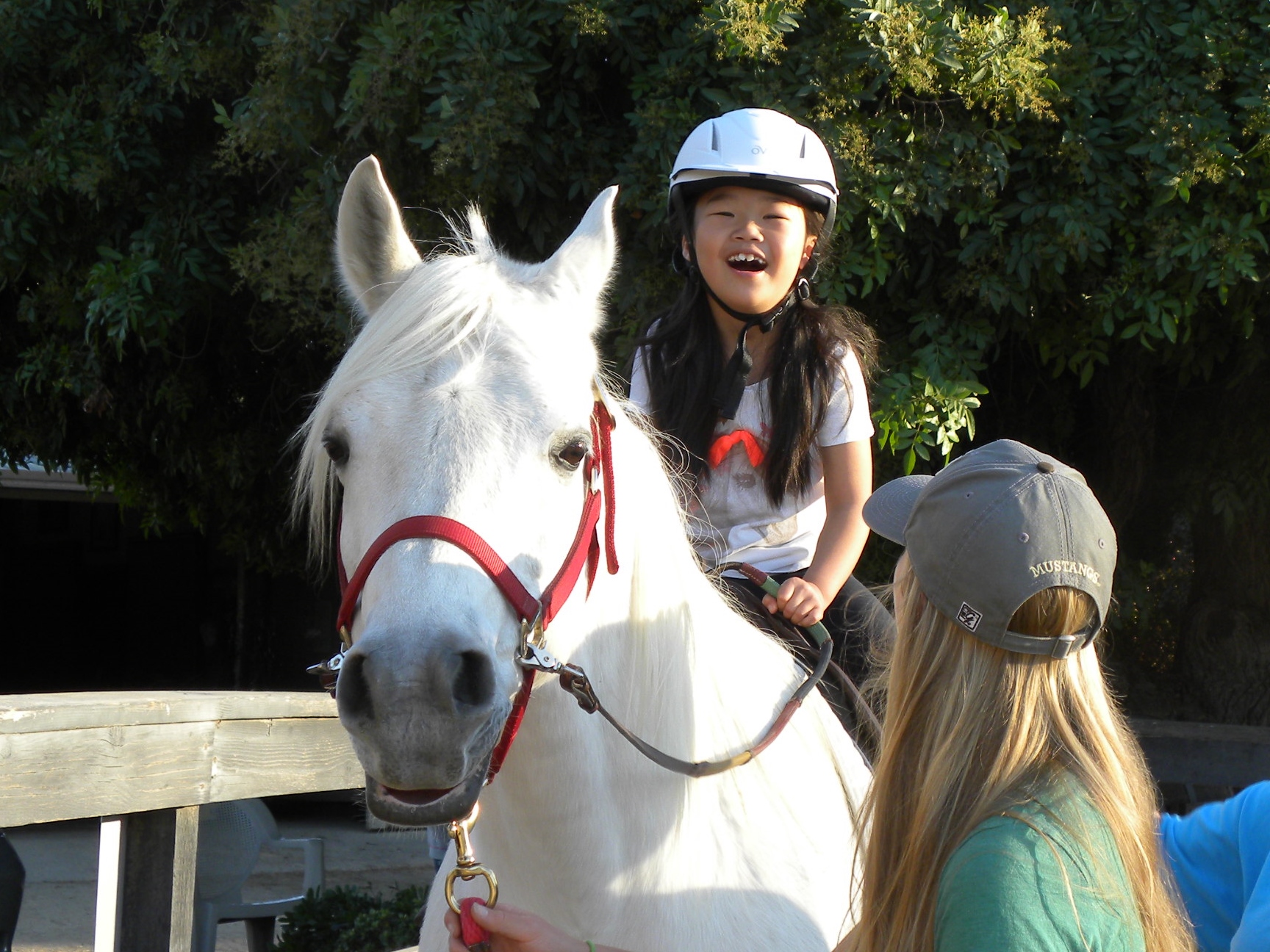“Whoa…Walk-on,” . . . as the child with disabilities or a difficult life situation learns how to control the horse and in return learns assertiveness, gains confidence and receives power and acceptance from the horse, he becomes quite familiar with these terms.
Such was the case with “Danny” (not his real name). Danny was a special case who came to the Little Riders program in Arroyo Grande, directed by Lisa Ankenbrandt and funded by Jack’s Helping Hand. “Danny was only three years old when he began his riding lessons. He is autistic and was unable to focus at all, was non-verbal, did not make eye contact, and was fearful, yet he did let me put him on the back of a horse, so I knew we could start there,” Lisa explained.
Danny progressed with his riding lessons, and along the way learned better focus. Lisa gave this example: “He stopped dropping his reins and would hold them correctly for the entire lesson. This was a big deal!” Then came the big breakthrough…after nine months of lessons, and just before the Christmas Holiday, Danny spoke his very first words… “Whoa…Walk-on.” He spoke them to his lesson horse. His parents were there that day to hear their then four year old son speak for the first time to a horse who offered the key that opened the verbal floodgate for Danny. Imagine the tears flowing from the eyes of all involved.
Little Riders Therapeutic Riding Program
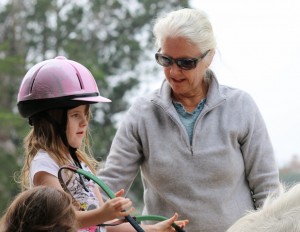 Lisa Ankenbrandt is not only the Director of Little Riders, but is also the one teacher. She started with two cancer patients in January of 2014, who wanted to learn to ride. Lisa, a PATH certified Therapeutic Riding Instructor, approached the former director of Jack’s Helping Hand for assistance and received the nod to begin her program.
Lisa Ankenbrandt is not only the Director of Little Riders, but is also the one teacher. She started with two cancer patients in January of 2014, who wanted to learn to ride. Lisa, a PATH certified Therapeutic Riding Instructor, approached the former director of Jack’s Helping Hand for assistance and received the nod to begin her program.
Now, Lisa and a team of volunteers provide kids with disabilities and life difficulties a place to learn to ride at the Wagner Ranch in Arroyo Grande, CA. Little Riders is funded by Jack’s Helping Hand, a non-profit organization, started by a couple who lost their three year old son to brain cancer. In the process of managing his illness, the family realized the SLO Community lacked the support needed for families dealing with kids who have specialized physical, mental and medical challenges. Karen Borges is the new director for Jack’s Helping Hand, and she is fully behind the Little Riders program. Karen states, “We sponsor ten kids for ten week sessions at $350 per session, so we support $3,500 of riding four times during the year which comes to about $14,000 per year.”
“Every part of the lesson is therapeutic,” Lisa explains. “Just putting on a helmet is therapy for children with sensitivity issues.” Mounting correctly can also be a therapeutic challenge, as can be learning how to halt and walk the horse under control of the rider. Lisa continued with this story, “We had a young girl join us for lessons who had severe emotional issues. She was very fearful to get on the horse and was overly concerned that she was hurting the horse. I was able to get her to accept that the horse could be touched without being hurt. She accepted that squeezing the horse to move forward was okay. She learned that the horse relates to us in a non-judgmental and forgiving way, even when mistakes are made. This boosted her self esteem and gave her the assertiveness that she was lacking. She has gained strength with her riding and is now posting quite confidently around the arena!”
Lisa is thankful for Eric Wagner and the Wagner Ranch, where lessons are held. All the program horses are boarded at the Wagner Ranch and are privately owned. Lisa rents the horses for lessons. Most are older Arabians that Eric has singled out first as program prospects. Lisa spends about three months working with each horse prior to using it in a lesson setting. Lisa has discovered that, “As these Arabians age, they become caretakers and can become quite mellow. They like being used for something. They are very attentive, and when I come out they whinny for me. They love their job, and we are careful about how often they are used.”
Each rider starts lessons with a leader and two side-walkers. The goal is to peel away the help starting with the leader and moving to the side-walkers. Some rider’s disabilities may limit how far the peeling can go, yet they still get to experience mounting, warm-up drills, and progression into transitions. All riders dismount to the ground. Each lesson is between 30-45 minutes, and can be private or in a group setting. And one more thing, “They always have to thank the horse!” Lisa exclaimed and went on to say,
“A miracle happens every Saturday out here!”
Benefiting Beyond the Saddle
The riders are not the only ones who benefit from the program. The parents and guardians of the children in the program are refreshed with the change of scenery, and with the joy of watching the children delight in the horses. Some are truly touched by the horses themselves. Lisa related a story: “We had a young girl whose medical condition had progressed, which made it harder and harder to get to the ranch. One day, her mom brought the girl to the ranch and carried her out to visit their favorite lesson horse. The horse seemed to feel the hurt in the mother and put his muzzle up to her; she was brought to tears, and her daughter enjoyed the moment with a giggle.”
Get Involved
Riders can find out about the program through Jack’s Helping Hand website and their Facebook page. New riders are put into the program that Jack’s Helping Hand funds on a first-come-first-serve basis. Any rider can come out and pay the individual lesson fee on their own. Lisa presently has 13 riders and 15 volunteers, as well as 6 dedicated horses. The program is limited in size due to volunteers and the facility, as it is also a training and boarding barn. Volunteers are trained, and do not need prior horse experience, but must not be afraid of horses. Lisa is currently looking to train more volunteers.
There is a bright future in store for Little Riders, as Jack’s Helping Hand is in the process of developing 15 acres of land in Nipomo for the future site of Jack Ready Imagination Park, which will include a full time Therapeutic Riding facility, complete with a covered arena and living quarters. Phase One, which is the development of the universally accessible play park got underway with a ground-breaking ceremony on April 4, 2014. Phase Two will be the Therapeutic Riding Center, which will eventually work on developing its own funding.
“The sooner the funding comes in, the sooner it will begin!” Lisa expressed. She has plans to continue teaching kids at the new facility. Jack’s Helping Hand has a few fundraisers on the calendar to keep the vision alive, and to bring Jack Ready Imagination Park into full reality. Perhaps you can be a part of that vision!
Photos courtesy of Little Riders.
